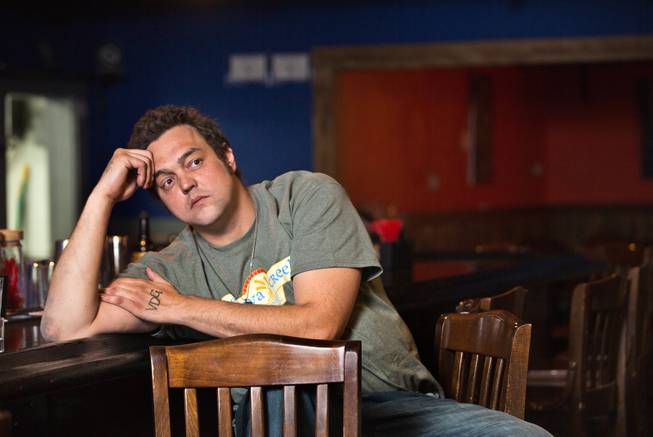
Owl bar and restaurant owner Stephan Galdau contemplates his effort to obtain a gaming license.
Wednesday, Dec. 21, 2016 | 2 a.m.
Stephan Michael Galdau stood waiting for judgment, his hands curled over the edge of the wide podium in the wood-paneled hearing room of the Nevada Gaming Control Board on East Washington Avenue.
Galdau was asking to withdraw his application for a gaming license for his restaurant, Owl, so he could quickly reapply, then install slots at his struggling business.
It was the second time he had been there. The first was in April when the board reviewed his gaming application and his background investigation. It had not gone well.
So on Nov. 3, Galdau stood before the three-member board again, this time asking for a do-over. And this hearing, too, was not going his way.
“I mean, I can see that you love your mom and dad. You have, what? Their initials tattooed on your hands there?” asked the board’s chairman, A.G. Burnett. It was one of several attempts Burnett made to stay positive with Galdau while gently leading him to accept the conclusion that was clearly coming.
It had been a long morning, and Burnett gave Galdau plenty of time — an-hour-and-a-half — to plead his case. Galdau used every minute to justify the decisions he’d made since moving to Las Vegas and explain why he deserved a license despite what the investigators had found.
Galdau often got emotional during the hearing, at one point struggling to find the bottle of water the board typically leaves under the podium for speakers to moisten their throats.
Talking fast, he described how he had changed since April; he hasn’t placed a bet since January, hasn’t used drugs since May; and how — if he doesn’t get a gaming license soon — he’ll lose his restaurant.
“I essentially live at the bar,” Galdau said. “I sleep there six nights out of the seven nights. Go home Sundays to sleep. But I can’t cut any more. I’m trying to cut my labor, that is why I bartend all the time trying to live on my tips. "But without that gaming revenue to attack those loans, I estimate conservatively I have 60 to 90 days before I will be forced to close.”
Owl occupies one end of an L-shaped building on Russell Road just west of Valley View Boulevard. The area is filled with warehouses and businesses that sell electrical equipment, restaurant supplies and parts for four-wheel-drive vehicles.
When he took over a year ago, Galdau says, the place was “rife with drug dealers, addicts and pimps.” But now, his clientele includes mostly couples and women. Still, despite the changes he’s made, sales have dropped significantly. He sees a gaming license as an economic lifeline.
Galdau’s desperate testimony highlights something few outside of the gaming license process know. For some people, the journey to getting a coveted gaming license is marked by intensely personal stories filled with details of crime and drug use and permeated with themes of hope and disappointment.
Restricted vs. Non-Restricted
Typically, the board has two days of hearings each month. The first is for non-restricted licensees — casinos with 16 or more slot machines and table games, game manufacturers and other large gaming-related businesses.
At non-restricted hearings, well-dressed, often highly paid executives come before the board with lawyers from some of Nevada’s most prominent law firms to talk about their backgrounds and how they’ll run their multimillion dollar companies.
On Nov. 2, the day before Galdau’s hearing, executives from Lucky Dragon spoke about their plans to market to Asian people in Las Vegas, the western U.S.and wealthy gamblers from China.
During that same hearing, Burnett had some fun with Philip Hedley Bowcock, an executive with international sports bookmaking company William Hill, who was applying for suitability as a key executive.
It was the kind of relaxed, conversational patter heard at business luncheons or in conference rooms as people enter and sit down for meetings. Burnett praised Bowcock’s background investigation — “the results were glowing” — and asked if the rumors about him becoming CEO were true. Bowcock politely deflected the question.
The contrast between that exchange and the one Burnett had with Galdau, during the next day’s board hearing, the one dedicated to restricted gaming licensees, was stark.
Burnett spoke about why Galdau was back before the board and having to review issues the board had with his personal gaming activities, business operations, experience and, Burnett said “some issues in regards to your personal life regarding use of drugs.”
Restricted licenses are typically given to small businesses and they allow the operation of 15 or fewer slot or video poker machines. The people who appear at these hearings operate convenience stores, grocery stores, or small bars and restaurants like Galdau’s Owl.
Burnett said the differences between their hearings and those of the non-restricted businesses are dramatic.
“You have the people who say, run a bar or tavern and they are vastly different than the CEO of a publicly traded company,” Burnett said. “And yes, when you sit through our Wednesday sessions you have people who are of very educated backgrounds with a high net worth, sometimes billionaires. And when you go to the restricted agenda, you see people who in many cases are simply trying to make a living.“
Burnett said emotional hearings like Galdau’s regularly occur, but the licensing process usually filters most of the drama.
When the board receives an application for such a license, it reviews the location to see if it’s manageable and it conducts a background check on the applicant, talking to law enforcement agencies and examining criminal and financial records.
“We share that information with the applicant,” Burnett said. “A lot of times, if there are a lot of issues or problems, it doesn’t even get further than that. It doesn’t get to the agenda.”
In fact, many times there’s no drama to uncover.
That was the case for one application heard an hour or so after Galdau’s. Maria Liza Ochia, who with her husband owns several Las Vegas Valley restaurants, was asking to have 15 slots in her restaurant on Maryland Parkway.
Burnett asked Ochia about her business and her life in the community.. After a few minutes of discussion, the board approved her application.
Conversely, it’s also true that some drama can sometimes sneak through at the non-restricted hearings.
During the non-restricted hearings on Nov. 2, one executive had to explain his run-in with drugs. He showed the requisite contrition — explaining that it was a one-time thing he did when his marriage was failing — and the conversation returned to issues like his work history.
A wake-up call
In Galdau’s case however, despite his repeated expressions of contrition, the board wouldn’t cut him a break.
“They only focus on the red flags,” he said. “If a candidate doesn’t have any red flags, then it’s easy-peasy. You know, it’s like sometimes when you date a woman and she only focuses on one bad thing. They’re going to focus in on that one bad thing.”
Looking back, Galdau described the process in two seemingly contradictory ways.
On one hand, the ordeal was a much-needed wake-up call.
“They were right about everything they said about me,” Galdau said. “In all their issues and all their concerns, they were spot-on. Sometimes it takes another person to see who you really were. That was the board saying to me, ‘Are you kidding me? You’re self-destructing. You’re acting immoral.”
At other times, he said the board simply didn’t understand him.
“I had never gambled in my life when I moved here in 2012. I didn’t even know what a progressive was. So in 2015, I gambled $150,000,” he said. “I bet at gaming bars, and I was developing a relationship with hard-core gamblers. They didn’t understand I was using it as a form of gambling research. So that was very difficult for them.”
“One issue they had was they hated my social media,” he said. “I was constantly promoting myself, and so I was out gambling, drinking and eating. And they saw me at all those bars at the time.”
Burnett wouldn’t share the results of Galdau’s investigation — those files are confidential. And he was reluctant to talk details. He would only speak generally about the hearings.
“While it was gut-wrenching and long and difficult, it played out as it should have,” Burnett said. “It was a fair hearing, and he had every opportunity to state his case.”
Still, whether it was a learning experience or a process filled with misunderstandings, Galdau said it was emotionally devastating.
“That was two hours, I have to say, that were worse than anything I’ve ever experienced as an adult,” he said. “You know what they say, that speaking in public is a what a lot of people are afraid of?
“Now take going before a commission and a board and not just speaking in public but talking about (stuff) you want nobody to know about. And it was all on public display. Even a day or two after, I was still traumatized from being judged and ripped and ridiculed.”
But this is government, so of course November’s board meeting wasn’t the end. Galdau still had one more hearing to attend.
The last stop
While the board receives the applications and investigates, at the end of the day, it only makes recommendations. The five-person Nevada Gaming Commission has the final say, either upholding or rejecting the board’s recommendations. It’s the last stop for applicants who have failed to impress the board.
In this case, the board recommended to deny with prejudice Galdau’s application for a license and his request to withdraw that application. If the commission agreed, Galdau would have to wait a full year to reapply, rather than just a few months like he had hoped.
So once again, on Nov. 17, Galdau found himself standing at the same podium, in the same wood-paneled room, asking for one last shot at quickly getting the license he says he needs to save his restaurant. And once again, things did not go well.
This time, the conversation was mostly with Dr. Tony Alamo, the commission’s chairman. But it sounded a lot like the exchange Galdau had with Burnett a few weeks earlier.
It began with the formalities, Galdau stating his name for the record and Alamo explaining how the hearing would proceed. Alamo then adopted the tone of a concerned and patient father about to spell out some of life’s hard truths.
“Do you need some water? Did you not show up today with counsel? Are you here by yourself?” Alamo asked before explaining that the commission has to unanimously overturn the board’s recommendation. If even one commissioner objects, the recommendation stands.
“I wish we had the ability of a withdrawal or other options like the board does,” Alamo said. “But we don’t. And that is statutory. I’m here to follow the law, not break it.”
Galdau, realizing there was no hope, gave up.
“I’m not going to waste the commission’s time or the board’s time,” he said. “I did not know there wasn’t a middle ground.
“I’m not ready. I’m not the suitable, traditional candidate that you require or that license demands. I have only begun that process both in my personal life and in my business life. So if there is no middle ground and if I understand that correctly, Mr. Chairman, that it is either uphold the decision of the board or license, I wouldn’t waste your time. I would say uphold the decision of the board.”
And that’s exactly what happened.
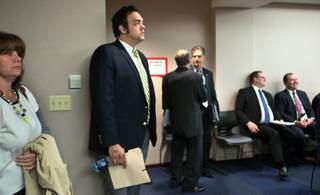
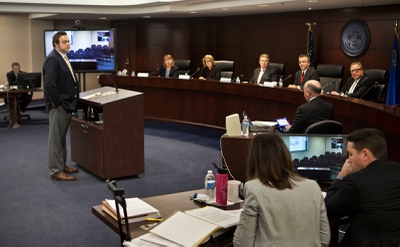
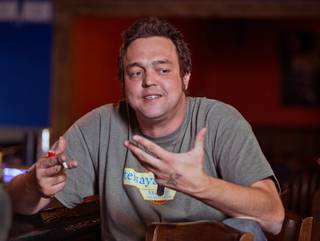
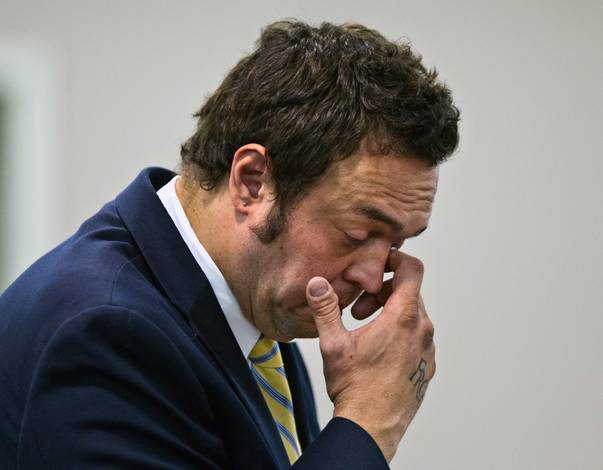
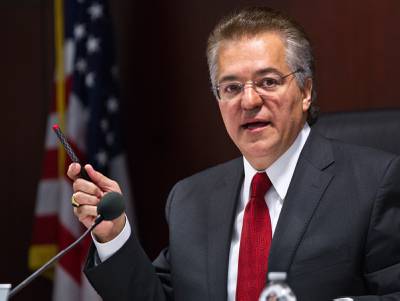

Join the Discussion:
Check this out for a full explanation of our conversion to the LiveFyre commenting system and instructions on how to sign up for an account.
Full comments policy